Amidst a delicious chaos
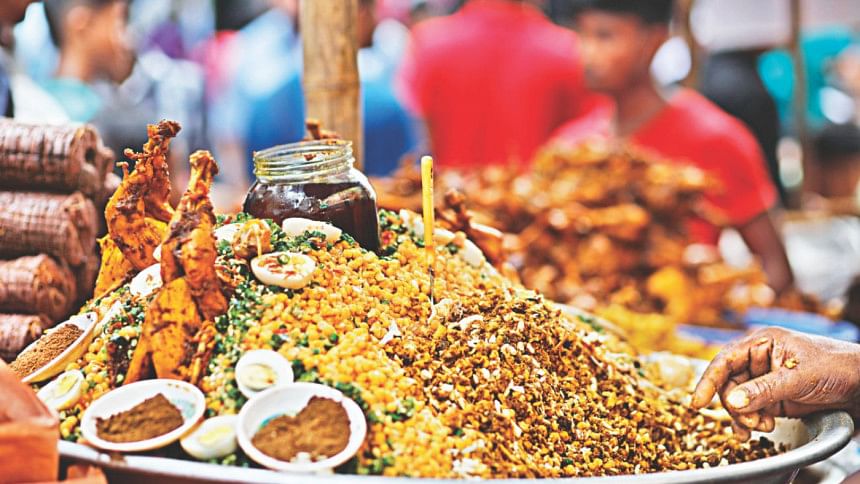
As soon as the clock strikes 12:00pm, an army of workers descend upon the footpaths and roads in front of Chawkbazar Shahi Mosque. In less than thirty minutes, hundreds of makeshift shops are set up. The cries of hawkers peddling ornaments, towels, lemons and many other things begin to be replaced by exotic, mouth-watering smells. Fragrances that tempt the resolve of the strongest of men waft through the air. This is Chawkbazar during the month of Ramadan.
Chawkbazar's storied century old history is well documented. More prominent though is the area's love affair with unique iftar items. If you have heard of a famous new iftar delicacies, chances are it was born here, amidst a chaos so delicious that all the shoving and shouting are forgotten. Nothing but the food matters here. And their taste is a reflection of that very sentiment.
Habibur Rahman, an enthusiast, in his book “Dhaka Panchas Baras Pahle,” first brought to fore the idea of special items available only in Chawkbazar. Back then, in the late 1800s, this was the only place that had such an iftar hub. The rich and poor would all throng the place, much like today, to find the best iftar items in the country. Habibur's information-rich book also helped prove that, contrary to popular belief, Chawkbazar's history went a lot further back than only a 100 years.
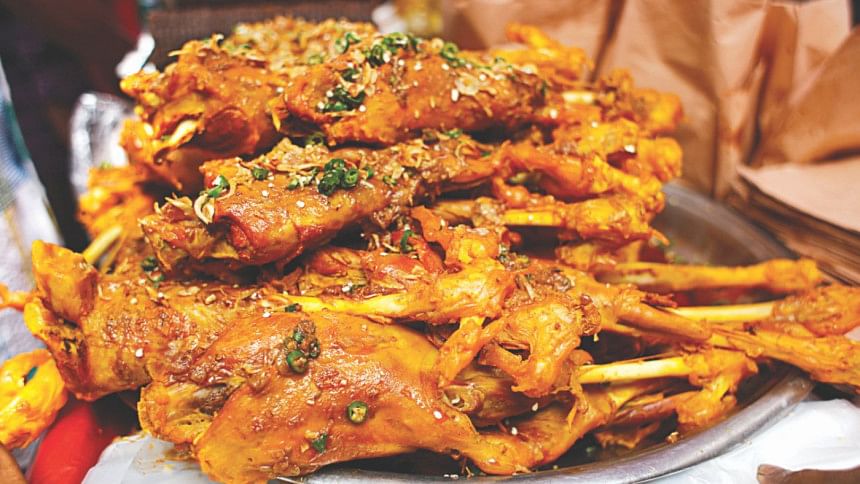
More importantly, it showed that even in those days, Chawkbazar's iftar meant special delicacies. “Golapi ukhra” was one such thing that was never seen anywhere apart from during Ramadan. Lucknow's famous Alaudin Halwai also set up shop there, attracted by the large number of crowds.
Nimokpara samosa and Lucknow sheermal, a saffron-flavored traditional flatbread made in Greater Iran and India were only available in this shop.
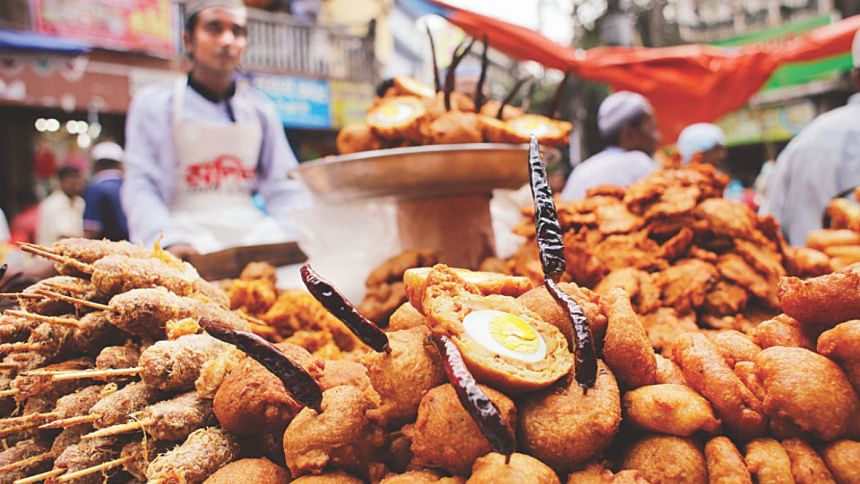
Soon, Chawkbazar, along with the city, had changed. But the area still retained its affinity with iftar, a tradition that continues till this very day. Today, when it comes to unique iftar items, Chawkbazar still remains the best place to find them.
Among them, is the Boro Baaper Polay Khai, a delicious concoction made with chickpeas, minced meat, fried potatoes, piyaju, beguni, chira, chicken, eggs and many different kinds of spices and ghee.
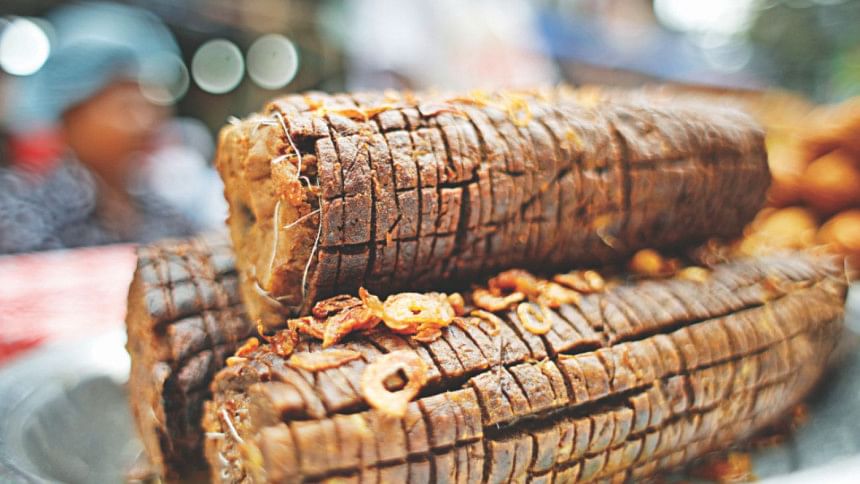
In the market, many of the sellers claim to have originally come up with the recipe. From Mohammad Hossain to Selim Baburchi to Mohammad Salekin, all fight for credit for coming up with this famous recipe.
While its creator may not be easy to find, the etymology of the name is well known. The name came from the fact that only well-off people could afford such a decadent mix of chicken and beef. Priced at TK 400 per kg, the moniker is certainly justified.
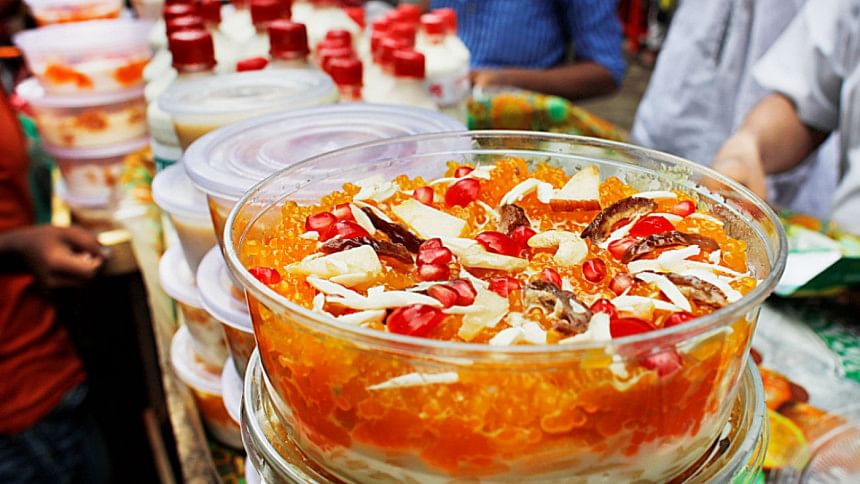
If Boro Baaper Polay Khai is not hint enough, shahi jilapis, weighing almost 1 kg and another unique delicacy, certainly help clarify an unspoken truth about this iftar bazaar: Chawkbazar, much like the people of Old Dhaka, loves to indulge in a little extravagance. Here, everything is larger than life. Where New Dhaka touts slimmer, crunchier jilapis as the best, Chawkbazar still hawks these gigantic jilapis which attracts people in droves, each bite full of juicy sweetness.
While jilapi can draw its origin from as early as the 15th century, some say these shahi jilapis are a more modern addition.
“It started here a few decades ago. Families would buy them and eat together. It soon became popular in even weddings and then many started making it,” Alam, an iftar seller at the market said. He said the word shahi had more to do with the size and prestige of the item rather than its origins. Imtiaz Aman Joy, a regular shopper here, though explained that the jilapis came from the Dhaka Nawab family. “They would eat it during family occasions and that's where the idea came from,” he said.
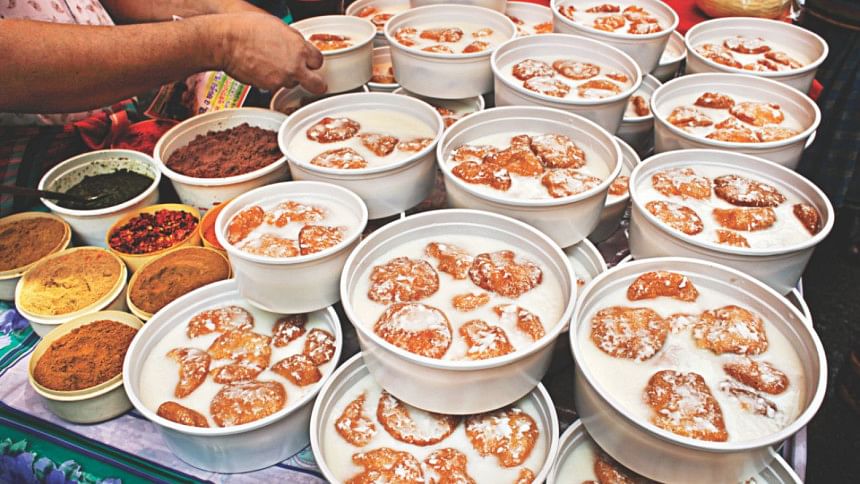
Leaving behind the fried sweetness, one can find a lot more. The air, so redolent with aromas, draws shoppers from one shouting salesman to the next. Nameless shops compete solely on the basis of food presentation and reputation. When those aren't enough, extravagance returns once again. Shuti kebab, a kebab made of tenderly grilled minced meat, has always been a fixture of the iftar market here. But every year, their size seems to get bigger. Whispers abound of a legendary 5 feet long shuti kebab. Salim, whose shop became one of the sources of this myth, however dispelled such rumours. “We have made them tall indeed, maybe 2-3 feet,” he said, downplaying the significance of kebabs even that tall. “This is another Mughal tradition. They would use almost 20 kgs of meat to prepare such kebabs. Imagine how much that would cost now,” he said.
The shops next to his also display stacks of tall structures of kebabs. Each shopkeeper, when not screaming the names of their wares, shout slogans or praises of their products.
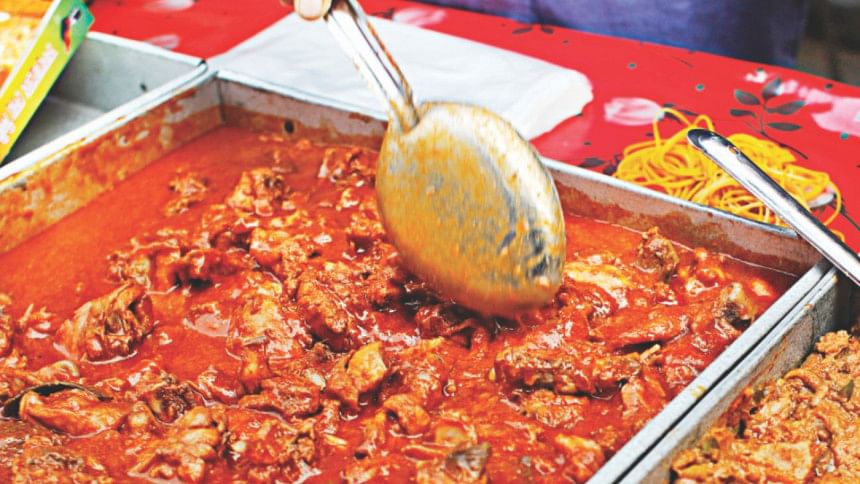
Abdullah, one such shopkeeper, continuously informed passersby of the specialty of his halim. What was the specialty? An ingredient untried before? Or something even more secretive. “The special halims are not special due to any significant distinction,” Abdullah said. “We all have different ways of making it and different levels of expertise. That's how one can be better than the other,” he said. Although he did not fail to guarantee his was the best, the next few shopkeepers also claimed supremacy.
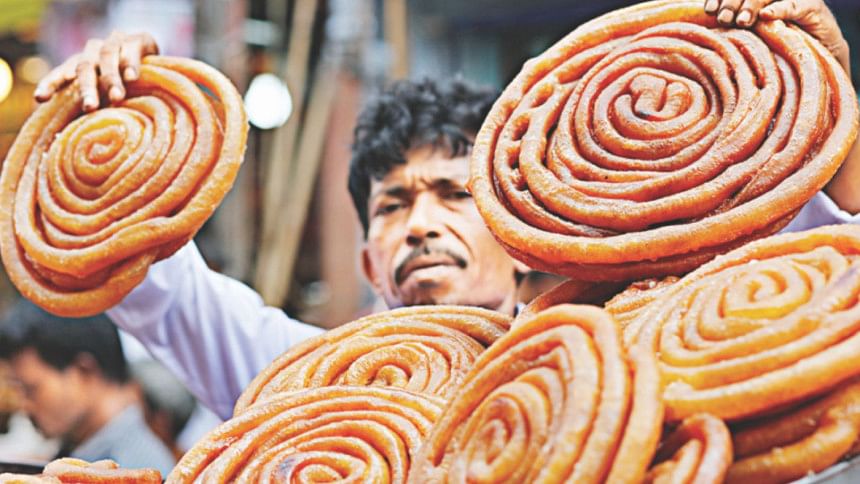
This was the same case with the Dohi Boras. While there was hardly a decipherable factor separating the many variations of the same item sold in different places, the shop owners took real pride in their own work. For each, their product was the best and that is why they were here in Chawkbazar; a divine place offering a pilgrimage to the culinary richness of Ramadan.
Syed Rahman, a shop owner, offers another rationale behind this pride. “For many of us, this business is a family tradition. My grandfather was a cook here and he passed it down to me. I will pass it on to my children and thus our family's name will continue,” he said.
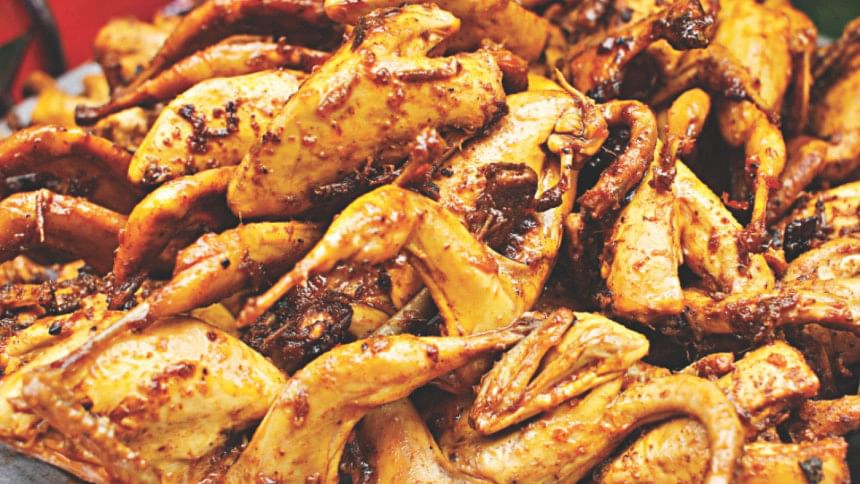
From halims to dohi boras to kebabs, Chawkbazar always manages to punctuate the uniformity with delicious disturbances which break the culinary monotony. This promise is never broken. Walking onward into the unending iftar bazaar, one can always find that subtle difference in the wares, the special trinket separating one shop from the rest. Three such things are the fist-sized egg chops made using duck eggs, the tantalising-looking fried koels and the intimidating roasts of an entire lamb leg. The koels though play a vital role in explaining that even here, size doesn't matter all the time. The taste is what keeps the people coming back for more.
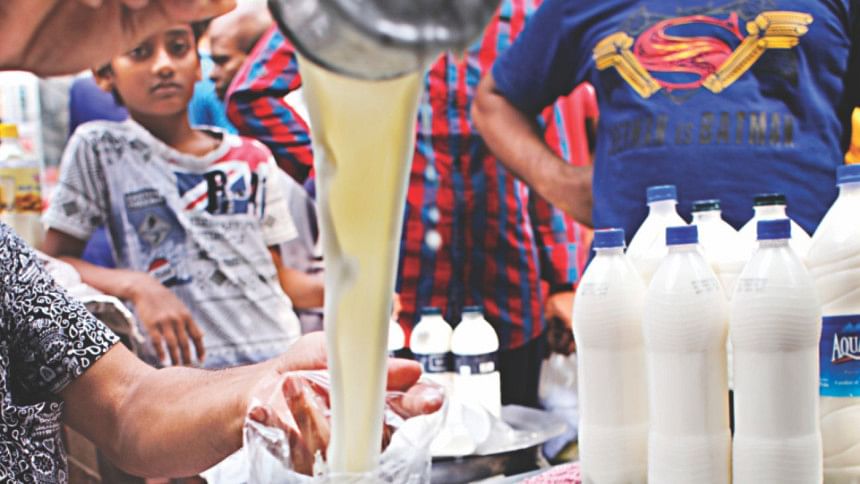
Chawkbazar can be seen as quite a mythical place, rich in history and fragrances in equal measure. One can easily spend hours here, idling from one shop to the other. Even then though, it would be impossible to catch all the stories and lore that make Chawkbazar what it is today. It is a magical place where the rarest and most luxurious delicacies are sighted, once a month every year, during the holy month of Ramadan.
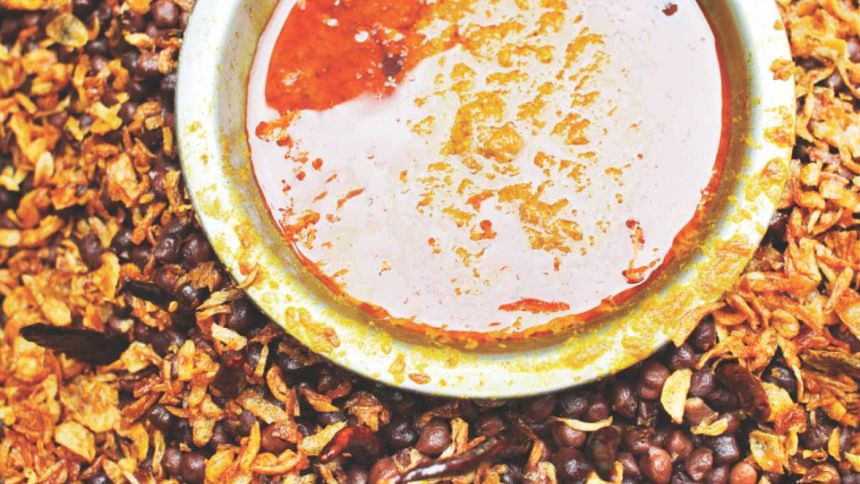

 For all latest news, follow The Daily Star's Google News channel.
For all latest news, follow The Daily Star's Google News channel. 



Comments